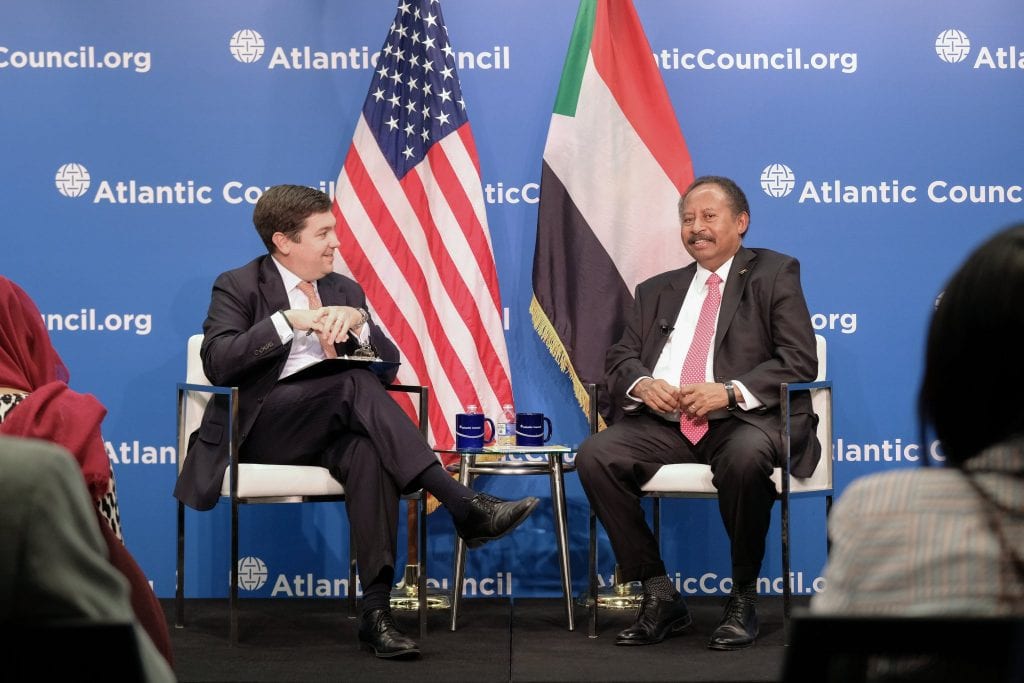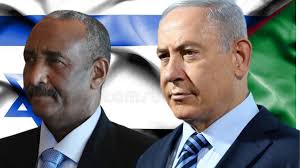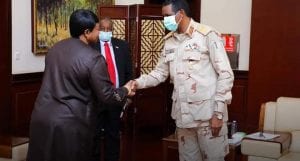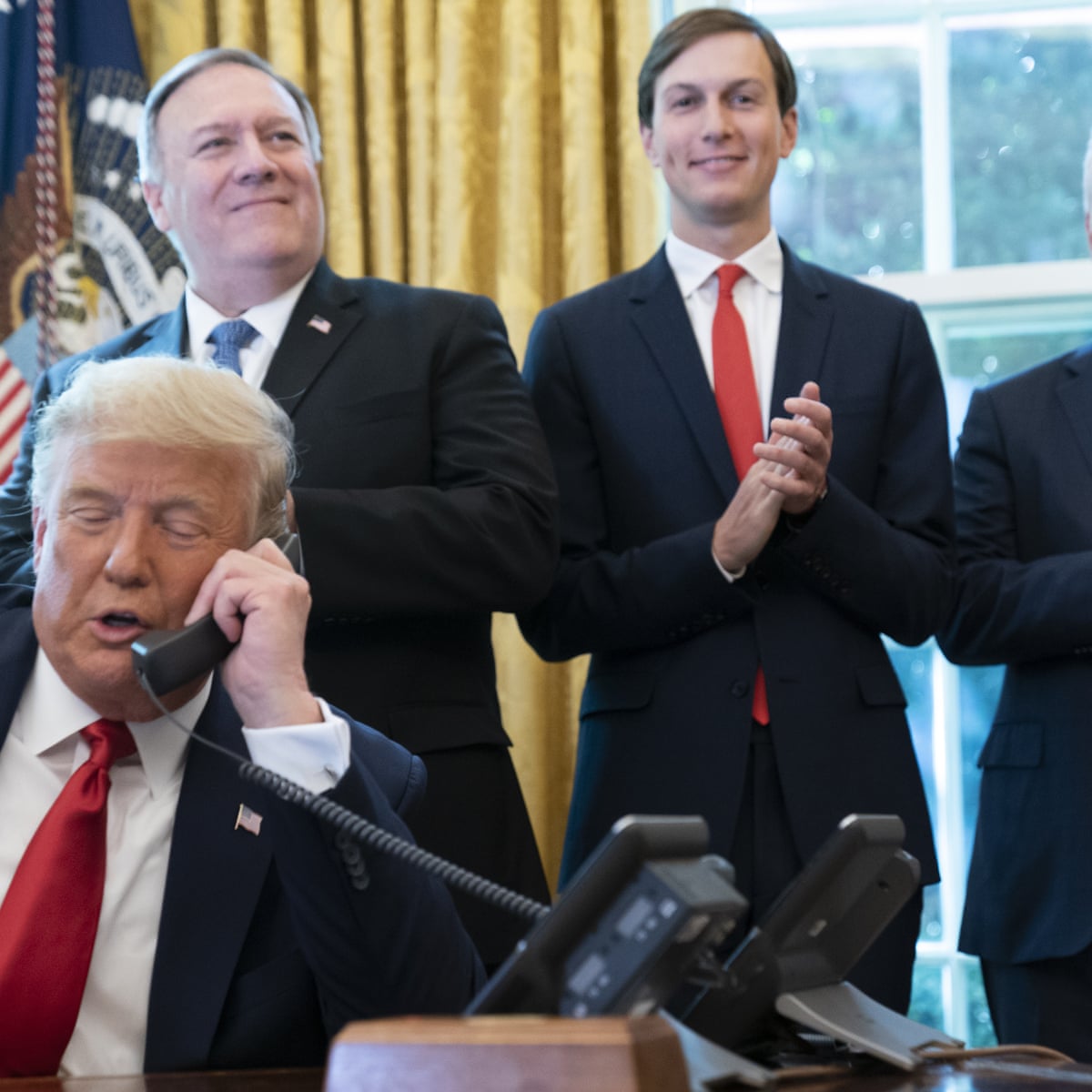Sudan’s new ties with the West, who benefits?
12 November 2020
Last month the US government finally committed to lifting Sudan from the State Sponsor of Terrorism (SST) list. Analysts claim the agreement came with an additional stipulation, a quid pro quo that Sudan normalises relations with Israel.
The announcement incurred a huge sigh of relief for many Sudanese who have endured the pariah status for over 25 years. But whether this agreement was designed to support Sudan’s civilian government and citizenry as opposed to the country’s military wing and their middle-eastern supporters is still up for debate.

Still valid with Biden victory?
Concerns also remain as to whether this agreement will be fulfilled under the new upcoming US leadership since the deal was signed under the outgoing Republican president, Donald Trump. The two senators who opposed the deal, after all, were from the Democratic Party –Chuck Schumer and Bob Menendez. But according to Cameron Hudson, Senior Fellow at the U.S.-based foreign policy think-tank the Atlantic Council and long-time former Chief of Staff for the Office of the US Special Envoy to Sudan, the SST delisting process should be complete before the change in office. “It is a 45 day review period, which we are currently in and will end in mid-December,” Hudson told Ayin. “I don’t anticipate Congress having either the attention span or the interest in trying to block Sudan’s delisting.”
The delisting removes Sudan’s status as a pariah state and allows the international community to bring in unfettered aid to a transitional government struggling with a huge budget deficit and unprecedented inflation levels that soared past 200% last month. The US directive also lifts Sudan’s travel ban to the U.S. and encourages additional development and humanitarian assistance reportedly worth hundreds of millions more than current aid levels. Further, the State Department has pledged to hold a US trade and investment conference for Sudan, engaging the World Bank and International Monetary Fund to discuss restructuring Sudan’s $65 billion external debt, Hudson says.
The delisting has brought indicators that American companies will begin trading with Sudan without fear of incurring legal exposure and hefty fines. The California-based tech giant Apple Inc., for instance, recently updated its legal guidance related to dealing with Sudan, removing the “complete embargo” status. Last month, the American energy giant General Electric (GE) signed a memorandum of understanding with Sudan. GE said in a statement it planned to deliver electricity to about 600,000 households through mobile turbines that can be installed within months and the rehabilitation of three existing power plants. “This is great news really,” says Omar Ibrahim, an owner of an electronic goods shop in Khartoum’s sister city, Omdurman. “For too long we had to use other, difficult means to import computers –even parts, which increases our prices and disappointed our customers.”
Gradual benefit
It will, however, take considerable more time until Sudanese citizenry will benefit from the SST lifting says Lauren Blanchard, a specialist in African Affairs with the Congressional Research Service. “The Sudanese government hopes, of course, that it will encourage foreign banks to consider re-establishing correspondent banking relationships, but that isn’t something that will happen overnight,” she says. “Delisting will allow the United States to engage more supportively at the IMF and World Bank, including with respect to Sudan’s progress toward attaining debt relief, but even on that issue there are other factors at play that mean there won’t be a clear immediate impact.”
“We have a number of Middle-Eastern actors, predominantly the UAE, the Saudi kingdom, Egypt and now Israel –[they] all have their own particular interests in Sudan but none of them, unfortunately, have a demonstrable interest in democracy”
—Sudan analyst Alex DeWaal, World Peace Foundation, Tufts University
While the transitional civilian government and public are naturally positive about the US delisting, questions remain over the US foreign policy motives and who in Sudan may benefit the most from this development. The US insistence on normalising relations with Israel, for instance, represented a foreign policy victory for President Trump ahead of the November elections and a political goal for America’s partners in the Middle East.
But this was never a goal for the civilian side of Sudan’s government, nor its people. Sudan’s civilian government were left unaware of their military counterparts’ efforts to normalise relations with Israel, according to an official within Sudan’s foreign ministry who spoke on condition of anonymity.
“The US has dealt with this as part of the [US] Middle-East peace plan, not as an African issue,” says Jonas Horner, Sudan’s Senior Analyst at the policy think tank, the International Crisis Group. “The process was done almost entirely through the Middle East Bureau [at the State Department] and not the Africa Bureau – the latter was largely cut out of this.”
For Sudan or for the Gulf?
Prioritising Gulf interests in Sudan over those of the countries’ people may prove the death knell to the transitional government’s attempts to establish a democratic system. “We have a number of Middle-Eastern actors, predominantly the UAE, the Saudi kingdom, Egypt and now Israel –[they] all have their own particular interests in Sudan but none of them, unfortunately, have a demonstrable interest in democracy,” says Sudan analyst Alex DeWaal and Executive Director of the World Peace Foundation, Tufts University. “They also have their favoured intermediaries who tend to be generals and the paramilitaries, people who are ready to serve the wider interests of the Middle-east.” Earlier this year, Israel’s Intelligence Minister, Eli Cohen, told Israeli broadcasters that “the Prime Minister (Netanyahu) held a historic meeting with the ruler of Sudan,” in reference to Sovereign Council leader Lt.-Gen. Abdel Fatah al-Burhan and not Prime Minister Abdalla Hamdok.

In February, Sovereign Council leader, Lt.-Gen. Abdel Fattah Al-Burhan met secretly with Israel’s Benjamin Netanyahu in the home of the Ugandan president in Entebbe. Al-Burhan’s close ties to the leadership in Egypt and the UAE certainly played a decisive part in Sudan’s normalisation deal. “Nothing was negotiated,” writes Libyan academic and journalist, Dr Mustafa Fetouri, “almost as if Sudan is a minor and the UAE is its guardian who knows what is best for the country and its people.”
Adding Sudan to the bloc of allied Middle Eastern countries strengthens the group’s efforts to counter Iranian and Turkish influence in the region, says Sudanese diplomatic analyst, Abu Shama. “It is true that the UAE and Bahrain have problems with Iran, and perhaps this is what prompted them to normalise relations with Israel,” Shama told Ayin, “but it is unlikely that Sudan will become part of this alliance, having no direct interest.”

Besides following the aspirations of their middle eastern backers, Sudan’s military leadership may have another key reason for seeking better relations with Israel and the west in general: immunity. The October visit by the International Criminal Court Prosecutor Fatou Bensouda may have unsettled several Sudanese military leaders who share a restive past in Darfur under the leadership of ousted president Omar al-Bashir. Improving relations with Israel and, by extension, the United States may help buffer these military leaders from past scrutiny. “They do not want to face the ICC,” says legal scholar Moneim Adam. “They are pushing hard not to be brought before the ICC as well as gain trust internationally.”
While the political and fiscal benefits to normalising relations with Israel for Sudan’s military leaders are clear, the same cannot be said for Prime Minister Abdalla Hamdok and the civilian government. For one, the premier and others have faced a barrage of criticism from both Islamist and left-wing parties. Abubaker Abdalrizig, a leader in the Islamist Popular Congress Party, believes the majority of Sudanese reject ties with Israel and will incite the public against the Forces for Freedom and Change –negatively impacting the country’s development. “Sudan will not benefit from relations with Israel,” Abdalrizig added. “Look at other countries Israel has developed relations with such as Jordan, Mauritania, Morocco –these relationships have not helped them.”
“If Sudan opens its economy up suddenly, the people best placed to access these new markets are those with existing access to foreign exchange and capital – the same people who have gathered their wealth from ill-gotten gains of the former government”
— Jonas Horner, Senior Analyst, Sudan, International Crisis Group
Sudan’s military leaders –whether from the army or militias—may also benefit the most economically from the US delisting. Once Sudan is fully removed from its SST status, major Western companies may be prepared to open business markets in Sudan –but few actors in Sudan will be in a position to trade with them except for those with access to capital and foreign reserves. Only Sudan’s elite may, at least initially, benefit from these transactions –an elite largely comprised of the military.
“If Sudan opens its economy up suddenly, the people best placed to access these new markets are those with existing access to foreign exchange and capital – the same people who have gathered their wealth from ill-gotten gains of the former government,” Horner told Ayin. The senior Sudan analyst says Sudanese authorities must consider some legal reforms such as anti-monopoly and anti-trust legislation, to safeguard Sudan’s economic landscape.
The delisting may not directly benefit Sudanese citizenry as it may the country’s already wealthy security military and militia leaders, but it does provide one commodity that is in short supply: hope. Nothing concrete could be achieved without this measure as the SST status acted as a dampener to any economic development, DeWaal said. “Yes, of course, taking us off the list won’t solve everything,” Ibrahim said, “but it is a start.”


